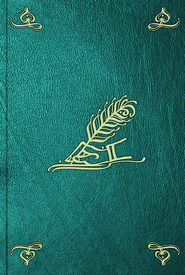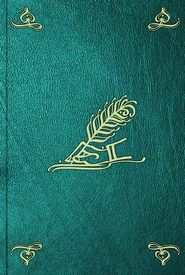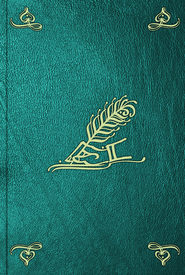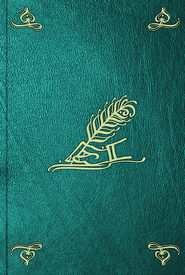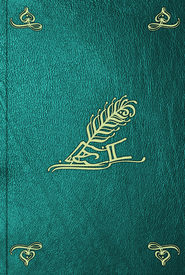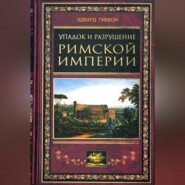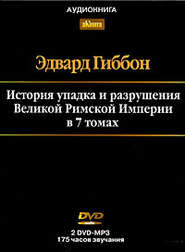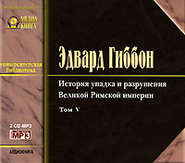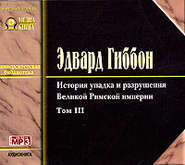По всем вопросам обращайтесь на: info@litportal.ru
(©) 2003-2025.
✖
Private Letters of Edward Gibbon (1753-1794) Volume 1 (of 2)
Настройки чтения
Размер шрифта
Высота строк
Поля
WARM DEFENCE OF HIS HONOUR.
I am much obliged to your friendship, for the advice you have given me with regard to my future conduct, and shall always pay the most sincere deference to it. Both prudence and inclination will engage me to get rid of the farm as soon as such a complicated piece of business can be transacted. With respect to my expences they shall always be proportioned to my income, and I am already preparing to discharge a cook, a groom, and other unnecessary Servants. There is one part of your letter which has given me, Dear Madam, very great uneasiness. You say that you have heard from undoubted authority that my own imprudences had so much embarrassed me, as to oblige me to make a concession which otherwise I might not have done. Were I conscious of these imprudencies, I should fairly acknowledge them, and endeavour by future behaviour to make some amends for past follies. But an innocent person has a right to speak a very different language. I know my own innocence, and without any vain protestations of it, I will at once come to such facts as must either establish it, or else expose me not only as a prodigal, but as a man devoid of honour and veracity. I therefore solemnly affirm the truth of the following facts.
1. When I returned from Switzerland about twelve years and a half ago, my father told me his affairs were a good deal embarrassed, and desired that I would joyn in cutting off the entail and in raising £10,000. I was then a raw lad of one and twenty, unacquainted with law or business, and desirous of obliging my father. He then gave me three hundred a year, a moderate allowance to which his eldest son would have had a natural claim, had no such transaction intervened.
2. Upon and within that allowance, I have constantly lived, except during two years and a half that I was abroad the second time. Whilst I was abroad I spent about seven hundred a year, a sum which, with the unavoidable expences of travelling, barely supports the appearance of an English gentleman.
3. I have never on any occasion received from my father any pecuniary inducements to consent to any step whatsoever, except once, four hundred pounds, near £100 of which were arrears of my allowances, and about the same sum I returned to my father when he wanted it very much.
4. I have never lost at play a hundred pounds at any one time; perhaps not in the course of my life. Play I neither love nor understand.
5. I have never taken up any money for myself, in any way whatever.
6. Neither at my father's death nor at any other period have I ever had any other debts than common tradesmen's bills, which are paid from one year to another, and even those to a very trifling amount.
I have tried to answer a general charge, as far as a general charge can be answered. But for our mutual satisfaction, let me intreat you, Dear Madam, to communicate that part of my letter to the persons from whom you received your intelligence. Desire that without sparing me they would contradict by facts any of those which I have advanced, or that they would mention any which I have suppressed. If they are unable to do this, your candour must allow that they were either weakly deceived, or wicked Deceivers. As I neither know nor wish to know who they are, Charity induces me to believe the former rather than to suspect the latter.
I think, Dear Madam, you will excuse my warmth. I should deserve the imputation could I submit to it with patience. As long as you credit it, you must view me in the light of a specious Hypocrite, who meanly cloaked his own extravagancies under his father's imprudence, and who ascribed to filial piety what had been the consequence of folly and necessity. As long as you credit it, I must be deprived of the esteem of a person, whose good opinion and friendship it will ever be my wish and study to deserve.
114.
To his Stepmother
10 minutes after Eleven, Saturday Night, 1771.
Dear Madam,
I have only time to tell you (being this moment come home) that I have received Arnold's draught, that I go into Bucks, Tuesday, shall return here Thursday, for Holroyd is in a violent hurry, and hope to be at Beriton Sunday. Should there happen any alteration I will write. Mes compliments à la vache Espagnole, et le White Calf.
I am,
Ever yours,
E. G.
115.
To J. B. Holroyd, Esq
October 6, 1771.
*Dear Holroyd,
I set down to answer your Epistle, after taking a very pleasant ride. —A Ride! and upon what?– Upon a horse. – "You lye!" – I don't. I have got a droll little Poney, and intend to renew the long-forgotten practice of Equitation, as it was known in the World before the 2nd of June of the year of our Lord one thousand seven hundred and sixty-three. As I used to reason against riding, so I can now argue for it; and indeed the principal use I know in human reason is, when called upon, to furnish arguments for what we have an inclination to do.*
I am obliged to you, for looking me out this Lancashire Man, who may assuredly be of use, and no less so for your intercession with Gosling or Clive. If he and his Partner will condescend to receive my Tribute, I am in no violent hurry to dispose of the Place, which under Mrs. Gibbon's management is certainly no losing Game. She thanks you for your Papers, and has delivered the Roster to Mr. Luff, who, though it is new, likes it hugely.
FARMER GIBBON
*What do you mean by presuming to affirm, that I am of no use here? Farmer Gibbon of no use! Last week I sold all my Hops, and I believe well, at nine Guineas a hundred, to a very responsible Man. Some people think I might have got more at Weyhill Fair, but that would have been an additional expence, and a great uncertainty. Our quantity has disapointed us very much; but I think, that besides hops for the house, there will not be less than 500l.; – no contemptible Sum of thirteen small Acres, and two of them planted last year only. This week I let a little Farm in Petersfield by auction, and propose raising it from 25l. to 35l. pr. annum: and Farmer Gibbon of no use!
To be serious; I have but one reason for resisting your invitation and my own wishes; that is, Mrs. Gibbon I left nearly alone all last Winter, and shall do the same this. She submits very chearfully to that state of solitude; but, on sounding her, I am convinced that she would think it unkind were I to leave her at present. I know you so well, that I am sure you will acquiesce in this reason; and let me make my next Visit to Sheffield-Place from town, which I think may be a little before Christmas. I should like to hear something of the precise time, duration, and extent of your intended tour into Bucks. Adieu.*
116.
To J. B. Holroyd, Esq
Beriton, October 25th, 1771.
Dear Holroyd,
To shew that I am not an ungratefull Wretch, I wrote immediately to Damer,[Footnote_144_144 - The Hon. John Damer, eldest son of Lord Milton, afterwards created Earl of Dorchester. His mother was Lady Caroline Sackville, daughter of the first Duke of Dorset, and sister of the then existing Duke; married, in 1742, to Joseph Damer, Lord Milton.] and to shew that I am a very careless one, I directed the letter to another person, whose Epistle went to Damer. Lord Milton's heir was ordered to send me without delay a brown Ratteen Frock, and the Taylor was desired to use his interest with his cousin the Duke of Dorset. The mistake has been rectified, but I have not yet had an answer. Is your Bucks Scheme settled, do you start and where do I meet you? I will attend you either in London, at Winslow, or at Denham,[Footnote_145_145 - Denham, Bucks, built in 1667 by Sir Roger Hill, came to Lewis Way through his marriage with Abigail Locke, Sir Roger's granddaughter. Lewis Way, who died January 24, 1771, left by his first wife one son, Benjamin, who succeeded to Denham, and one daughter, Abigail, wife of J. B. Holroyd. By his second wife he left another son, Gregory Lewis Way, the translator of Fabliaux; or, Tales abridged from French Manuscripts of the Twelfth and Thirteenth Centuries (edited by George Ellis, and published in two volumes in 1796-1800), who is more than once mentioned in these letters. Denham Place was the "pastoral retreat" of Sir Humphrey Davy.] where under your protection, I believe I might trespass for one night on Mr. Way. From thence, "Tencro duce et auspice Tencro," I will try to find out my little dairy. My Hops are well sold, with judgement, and that Judgement my own, for even Mrs. G. wanted me to keep them for Wayhill Fair, where they were a mere drug. The little farm, I told you of, I have raised from £25 to £38 pr. annum, but Plâit au ciel, that I had neither Farm, nor Tenants, they suit not my humour. I have wrote on the wrong side of the paper.
Your four-footed friend is not thought to have attained years of strength and discretion, however if you are impatient he shall be forthcoming. A two-legged friend of yours I breakfasted with this morning at Up-park, – Lascelles; he seems civilized. We abused you, your place, Wife, children, &c. &c., pretty much. Adieu.
E. G.
Pray write to me as soon as I wish, but much sooner than I deserve.
117.
To J. B. Holroyd, Esq
Beriton, Nov. 18, 1771.
*Most respectable South Saxon,
It would ill become me to reproach a dilatory correspondent.
"Quis tulerit Gracchos de seditione querentes?" Especially when that Correspondent had given me hopes of undertaking a very troublesome Expedition for my sole advantage, and indeed great would be the advantage. Yet thus much I may say, that I am obliged very soon to go to town upon other business, which, in that hope, I have hitherto deferred. If by next Sunday I have no answer, or if I hear that your Journey to Denham is put off sine die, or to a long Day, I shall on Monday morning set off for London, and wait your future Will with Faith, Hope, and Charity. Adieu.
I have had no answer from J. D., but will see him if in Town.*
118.
To his Stepmother
Sheffield Place, January the 8th, 1772.
Dear Madam,
A VISIT TO SHEFFIELD PLACE
I am safe housed at Sheffield Place where I arrived last Monday, and find it a very hospitable shelter against the snow which covers the Country. Here I shall stay till at least Sunday seven-night, and hope to receive the Map and Greyhound by the hands of Tregus. Aubrey has refused in a manner (though very polite) as shews plainly that the Puppy only sought to gratify his own Vanity. The Oracle is now writing a proper letter for the young Goose. Should anything immediately result from it, you may depend on the earliest intelligence.
I am, dear Madam,
Ever yours,
E. G.
119.
I am much obliged to your friendship, for the advice you have given me with regard to my future conduct, and shall always pay the most sincere deference to it. Both prudence and inclination will engage me to get rid of the farm as soon as such a complicated piece of business can be transacted. With respect to my expences they shall always be proportioned to my income, and I am already preparing to discharge a cook, a groom, and other unnecessary Servants. There is one part of your letter which has given me, Dear Madam, very great uneasiness. You say that you have heard from undoubted authority that my own imprudences had so much embarrassed me, as to oblige me to make a concession which otherwise I might not have done. Were I conscious of these imprudencies, I should fairly acknowledge them, and endeavour by future behaviour to make some amends for past follies. But an innocent person has a right to speak a very different language. I know my own innocence, and without any vain protestations of it, I will at once come to such facts as must either establish it, or else expose me not only as a prodigal, but as a man devoid of honour and veracity. I therefore solemnly affirm the truth of the following facts.
1. When I returned from Switzerland about twelve years and a half ago, my father told me his affairs were a good deal embarrassed, and desired that I would joyn in cutting off the entail and in raising £10,000. I was then a raw lad of one and twenty, unacquainted with law or business, and desirous of obliging my father. He then gave me three hundred a year, a moderate allowance to which his eldest son would have had a natural claim, had no such transaction intervened.
2. Upon and within that allowance, I have constantly lived, except during two years and a half that I was abroad the second time. Whilst I was abroad I spent about seven hundred a year, a sum which, with the unavoidable expences of travelling, barely supports the appearance of an English gentleman.
3. I have never on any occasion received from my father any pecuniary inducements to consent to any step whatsoever, except once, four hundred pounds, near £100 of which were arrears of my allowances, and about the same sum I returned to my father when he wanted it very much.
4. I have never lost at play a hundred pounds at any one time; perhaps not in the course of my life. Play I neither love nor understand.
5. I have never taken up any money for myself, in any way whatever.
6. Neither at my father's death nor at any other period have I ever had any other debts than common tradesmen's bills, which are paid from one year to another, and even those to a very trifling amount.
I have tried to answer a general charge, as far as a general charge can be answered. But for our mutual satisfaction, let me intreat you, Dear Madam, to communicate that part of my letter to the persons from whom you received your intelligence. Desire that without sparing me they would contradict by facts any of those which I have advanced, or that they would mention any which I have suppressed. If they are unable to do this, your candour must allow that they were either weakly deceived, or wicked Deceivers. As I neither know nor wish to know who they are, Charity induces me to believe the former rather than to suspect the latter.
I think, Dear Madam, you will excuse my warmth. I should deserve the imputation could I submit to it with patience. As long as you credit it, you must view me in the light of a specious Hypocrite, who meanly cloaked his own extravagancies under his father's imprudence, and who ascribed to filial piety what had been the consequence of folly and necessity. As long as you credit it, I must be deprived of the esteem of a person, whose good opinion and friendship it will ever be my wish and study to deserve.
114.
To his Stepmother
10 minutes after Eleven, Saturday Night, 1771.
Dear Madam,
I have only time to tell you (being this moment come home) that I have received Arnold's draught, that I go into Bucks, Tuesday, shall return here Thursday, for Holroyd is in a violent hurry, and hope to be at Beriton Sunday. Should there happen any alteration I will write. Mes compliments à la vache Espagnole, et le White Calf.
I am,
Ever yours,
E. G.
115.
To J. B. Holroyd, Esq
October 6, 1771.
*Dear Holroyd,
I set down to answer your Epistle, after taking a very pleasant ride. —A Ride! and upon what?– Upon a horse. – "You lye!" – I don't. I have got a droll little Poney, and intend to renew the long-forgotten practice of Equitation, as it was known in the World before the 2nd of June of the year of our Lord one thousand seven hundred and sixty-three. As I used to reason against riding, so I can now argue for it; and indeed the principal use I know in human reason is, when called upon, to furnish arguments for what we have an inclination to do.*
I am obliged to you, for looking me out this Lancashire Man, who may assuredly be of use, and no less so for your intercession with Gosling or Clive. If he and his Partner will condescend to receive my Tribute, I am in no violent hurry to dispose of the Place, which under Mrs. Gibbon's management is certainly no losing Game. She thanks you for your Papers, and has delivered the Roster to Mr. Luff, who, though it is new, likes it hugely.
FARMER GIBBON
*What do you mean by presuming to affirm, that I am of no use here? Farmer Gibbon of no use! Last week I sold all my Hops, and I believe well, at nine Guineas a hundred, to a very responsible Man. Some people think I might have got more at Weyhill Fair, but that would have been an additional expence, and a great uncertainty. Our quantity has disapointed us very much; but I think, that besides hops for the house, there will not be less than 500l.; – no contemptible Sum of thirteen small Acres, and two of them planted last year only. This week I let a little Farm in Petersfield by auction, and propose raising it from 25l. to 35l. pr. annum: and Farmer Gibbon of no use!
To be serious; I have but one reason for resisting your invitation and my own wishes; that is, Mrs. Gibbon I left nearly alone all last Winter, and shall do the same this. She submits very chearfully to that state of solitude; but, on sounding her, I am convinced that she would think it unkind were I to leave her at present. I know you so well, that I am sure you will acquiesce in this reason; and let me make my next Visit to Sheffield-Place from town, which I think may be a little before Christmas. I should like to hear something of the precise time, duration, and extent of your intended tour into Bucks. Adieu.*
116.
To J. B. Holroyd, Esq
Beriton, October 25th, 1771.
Dear Holroyd,
To shew that I am not an ungratefull Wretch, I wrote immediately to Damer,[Footnote_144_144 - The Hon. John Damer, eldest son of Lord Milton, afterwards created Earl of Dorchester. His mother was Lady Caroline Sackville, daughter of the first Duke of Dorset, and sister of the then existing Duke; married, in 1742, to Joseph Damer, Lord Milton.] and to shew that I am a very careless one, I directed the letter to another person, whose Epistle went to Damer. Lord Milton's heir was ordered to send me without delay a brown Ratteen Frock, and the Taylor was desired to use his interest with his cousin the Duke of Dorset. The mistake has been rectified, but I have not yet had an answer. Is your Bucks Scheme settled, do you start and where do I meet you? I will attend you either in London, at Winslow, or at Denham,[Footnote_145_145 - Denham, Bucks, built in 1667 by Sir Roger Hill, came to Lewis Way through his marriage with Abigail Locke, Sir Roger's granddaughter. Lewis Way, who died January 24, 1771, left by his first wife one son, Benjamin, who succeeded to Denham, and one daughter, Abigail, wife of J. B. Holroyd. By his second wife he left another son, Gregory Lewis Way, the translator of Fabliaux; or, Tales abridged from French Manuscripts of the Twelfth and Thirteenth Centuries (edited by George Ellis, and published in two volumes in 1796-1800), who is more than once mentioned in these letters. Denham Place was the "pastoral retreat" of Sir Humphrey Davy.] where under your protection, I believe I might trespass for one night on Mr. Way. From thence, "Tencro duce et auspice Tencro," I will try to find out my little dairy. My Hops are well sold, with judgement, and that Judgement my own, for even Mrs. G. wanted me to keep them for Wayhill Fair, where they were a mere drug. The little farm, I told you of, I have raised from £25 to £38 pr. annum, but Plâit au ciel, that I had neither Farm, nor Tenants, they suit not my humour. I have wrote on the wrong side of the paper.
Your four-footed friend is not thought to have attained years of strength and discretion, however if you are impatient he shall be forthcoming. A two-legged friend of yours I breakfasted with this morning at Up-park, – Lascelles; he seems civilized. We abused you, your place, Wife, children, &c. &c., pretty much. Adieu.
E. G.
Pray write to me as soon as I wish, but much sooner than I deserve.
117.
To J. B. Holroyd, Esq
Beriton, Nov. 18, 1771.
*Most respectable South Saxon,
It would ill become me to reproach a dilatory correspondent.
"Quis tulerit Gracchos de seditione querentes?" Especially when that Correspondent had given me hopes of undertaking a very troublesome Expedition for my sole advantage, and indeed great would be the advantage. Yet thus much I may say, that I am obliged very soon to go to town upon other business, which, in that hope, I have hitherto deferred. If by next Sunday I have no answer, or if I hear that your Journey to Denham is put off sine die, or to a long Day, I shall on Monday morning set off for London, and wait your future Will with Faith, Hope, and Charity. Adieu.
I have had no answer from J. D., but will see him if in Town.*
118.
To his Stepmother
Sheffield Place, January the 8th, 1772.
Dear Madam,
A VISIT TO SHEFFIELD PLACE
I am safe housed at Sheffield Place where I arrived last Monday, and find it a very hospitable shelter against the snow which covers the Country. Here I shall stay till at least Sunday seven-night, and hope to receive the Map and Greyhound by the hands of Tregus. Aubrey has refused in a manner (though very polite) as shews plainly that the Puppy only sought to gratify his own Vanity. The Oracle is now writing a proper letter for the young Goose. Should anything immediately result from it, you may depend on the earliest intelligence.
I am, dear Madam,
Ever yours,
E. G.
119.







